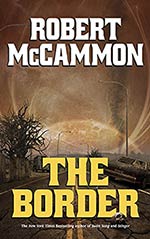
![]() Nymeria
Nymeria
3/12/2016
![]()
It's always sad when a book disappoints me, but it's worse when that happens with an author whose work I appreciated in the past: I discovered Robert McCammon several years ago with Swan Song, a gripping novel mixing science fiction and horror, depicting a world ravaged by nuclear holocaust and peopled by powerful characters on both sides of the fence, the survivors and the damned. I read two other books by him, They Thirst -- the story of a vampire invasion in Los Angeles, and The Wolf's Hour -- an interesting combination between history and fantasy, with a werewolf working as a spy against the Nazis; while not on the same level as Swan Song, they were both entertaining reads, so when I learned about The Border I was thrilled at the idea of a story that could parallel that first book I read.
The premise is indeed intriguing: Earth has been invaded not by one but by two alien races, yet for once our planet is not a place for mere conquest, but rather a battleground between creatures that have been dubbed Cyphers and Gorgons. Earth finds itself on the border (hence the title) of both races' expansion drive, so they fight each other for supremacy, uncaring of the collateral damage represented by humanity, whose survivors barely hang by the skin of their teeth, their civilization gone, cities reduced to burned rubble, water, food -- and most important safety -- running out at an accelerated pace.
The book opens as a teenaged boy, with no memory of who he is and how he came to be there, runs for his life as a fierce battle between Gorgons and Cyphers is waged around him: he's hurt, bleeding and at the end of his endurance, but there's a force driving him on -- maybe a strong survival instinct, maybe something else. It's a powerful start, one that draws you straight in and takes hold of your imagination. The boy, who will later on be called Ethan, is rescued and taken into a small community of survivors holding out in the remnants of a housing enclave -- and here is where the strong beginning of this novel starts to falter.
Ethan is quickly revealed as a special person: he uncovers a source of much-needed water under the complex's abandoned swimming pool, and he can project lethal energy that creates earthquakes or vanquishes attacking foes. His body exhibits signs of inexplicable changes and he's driven by a powerful imperative to reach the mysterious "White Mansion", where his unknown destiny must be fulfilled. The similarities to Swan Song's main character and her journey are evident, and while I found this mildly disappointing, it's not the key reason for my disenchantment with this novel. Ethan himself is too weak a character: the discovery of his abilities, the changes in his body, are both accepted far too easily and happen far too conveniently, while he remains a passive spectator of it all. I would have expected deeper emotions from him, from the loss of his identity to the discovery of the powers he's invested with, but while we are told about the way he reacts to what's happening, we are never really shown that any of it truly touches him.
Something along the same lines happens with the survivors of Panther Ridge, the enclave where Ethan finds momentary shelter: these are people at the end of their wits and supplies, their numbers dwindling daily from injuries, alien attacks and despair-driven suicides, but we never really get to know them as people, we are only told -- again -- about their emotions, or offered a few meandering dialogs that give little in the matter of true characterization. What's worse, they seem to accept Ethan's strangeness and his nebulous 'mission' with an amazing swiftness that seems to clash loudly with the strict measures taken until that moment against alien infiltration. Yes, because the invaders, as a side activity, take humans and perform genetic modifications on them, letting them loose among the survivors to wreak further havoc: that's the origin, for example, of the Grey Men, zombie-like hordes of flesh-eating ex-humans that plague the nights of humanity's remnants. The Panther Ridge dwellers devised a way to screen real humans from the fake ones, since injecting a saline solution into their bloodstream causes a negative reaction in the latter, and the fact that Ethan passed this test with flying colors seems enough to warrant such blind faith in him.
If the enclave's inhabitants' despair might justify this too-easy acceptance that looks like that of a drowning man grasping at anything to stay afloat, such a justification loses some of its strength when the group, embarking on a dangerous journey toward the mythical White Mansion, meets with a military contingent stationed in a former shopping mall. The garrison commander, described as a seasoned officer, takes the new arrivals' explanations for Ethan at face value, and after witnessing the boy's abilities in a clash with aliens, becomes a believer: he refurbishes the group's bus, gives them much-needed supplies (evidently the military have an inexhaustible reserve of them, even in the desperate conditions in which Earth now stands) and sends them on their merry way. This is where I drew the line, because my capacity for suspension of disbelief was stretched beyond its limit, the situation not helped by a writing that at times felt clunky, by the sketchy characterization, and by a few truly painful dialogs from a few secondary players.
And so, a little past the midway point, I abandoned my struggle to keep on reading, and see at least where the story was headed, unable to summon even the mildest interest in events or characters, though not without keenly feeling the loss of the unfulfilled promise of this book.
http://spaceandsorcery.wordpress.com